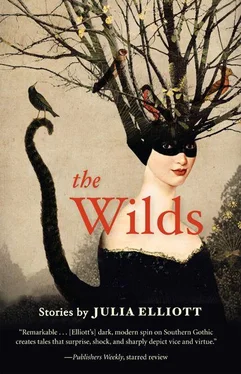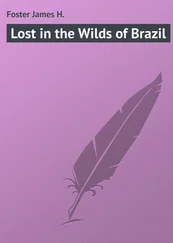“An amoeba is a one-celled organism,” he pronounced. “A protozoan, to be exact.”
Like many of Stein’s clarifications, this didn’t do much to inform the revelers as to what an amoeba looked like or how it behaved. So, after having his tankard refilled with Heineken, Stein sketched a picture of an amoeba on his napkin and passed it around the bar.
“It’s just a blob,” said Brandy Wellington. “I don’t see how that could eat anybody’s brain.”
“The brain-eating type has a little sucker that eats your cells,” said Stein. “And then you come down with a fatal case of meningoencephalitis.”
“I told my son not to go swimming this summer,” said Wanda Bonnet.
“He just needs to stay away from stagnant water,” said Tubs Watson.
This brought them around to a discussion of teens and their follies, an inexhaustible subject for those assembled, since most of them were either middle-aged parents or grandparents and thus had firsthand experience with the strange pupal state of the human life cycle, whereupon the organism transformed, almost overnight, from a sweet, well-behaved kid into a self-destructive, narcissistic goon, either monosyllabic or back-talking, a lurching zombie that ate up every morsel in the house and scattered filthy clothing all over the floor.
Marty Bouknight said his son was a video-game junky. Kim Dewlap said her daughter was a Twitter demon. Most everyone nodded in empathy, having lost a child to the cyber world at some recent point in time. Old Man Winger shook his head. He was an ancient biker whose denim jacket had grown into his epidermis and whose tattoos had faded to ghostly shadows that looked like bruises on his withered arms. He had a very sad story to tell about his cousin’s granddaughter Kayla. She was so into Facebook and Twitter and E-Live that she couldn’t brush her teeth without tweeting. And just last week, her mother had found her in the living room, pressing her face against their plasma monitor as though trying to break through to the other side. The room was littered with so much junk-food packaging that the poor child was practically buried in cellophane. And then she fell into a coma.
“She ain’t totally out but not exactly there either,” said Winger.
“What you think caused it?” asked Wanda Bonnet.
“They don’t know. They’re testing for organ failure caused by her junk-food diet.”
Every parent of a teen child felt sick, but then relieved that this misfortune had happened to someone else. A few drunken mothers clutched their bosoms. But when Carla Marlin started bragging about her new swimming pool, the conversation shifted toward brighter subjects — like waterskiing, catfish noodling, and time-share condos going cheap at Surf City.

Beth Irving was a vegetarian, partially for health reasons, but mostly because her line of work made her hyperaware of the intricate life cycles of infectious organisms. She couldn’t look at a piece of meat without imagining it swarming with bacteria and one-celled organisms, crawling with trichinosis roundworms or tapeworm larvae. Once again, she’d found herself in a godforsaken town with a malarial climate and no health-food store, and the only decent place to eat was an Indian buffet that put too much sugar in its eggplant vindaloo. The Centers for Disease Control and Prevention had stumbled upon another cluster of Toxoplasma hermeticus cases. And though Beth was thrilled to be on the research vanguard of what was quickly becoming recognized as one of the weirdest behavior-modifying protozoan organisms to emerge since Toxoplasma gondii , she always got depressed in these backwater towns with dead Main Streets and flood zones packed with double-wides.
Because Beth had grown up in a dying town in South Georgia, she always felt an uncanny sensation when cruising empty downtown streets or walking from pounding summer heat into the deep chill of a Piggly Wiggly. She feared she was getting sucked back into the haunted swamplands of Clinch County, locale of her birth. She pictured a giant Venus flytrap swelling up from boggy land, opening its green jaws, and swallowing her. And so, with a few hours to kill before meeting the ID specialist at Palmetto Baptist, she had no choice but to return to her room at the Days Inn, where she succumbed to the narcotic allure of the television. Flipping through channels, she felt a panicky wash of pleasure as the borders of her identity began to dissolve.
She remembered a film from Biology 629, a time-lapse sequence of a fox carcass devoured by necrophagous insects. The mammal shrank and then expanded with a moist infestation of writhing maggots that soon transformed into bluebottle flies that darted off to feed on wildflower nectar. Embracing the flux of disassociation might yield some exquisite Zen transcendence, she thought. Out of her usual context, she felt her self diffusing. Her Atlanta town house and boyfriend and collection of Scandinavian glass, her PhD and lucrative job with the CDC, her whole-foods organic vegetarian diet and Ashtanga yoga regime — all of it relegated to the realm of the theoretical, especially the boyfriend, who was eight years her junior, and whom she envisioned, with a shiver of arousal, making love to some faceless female with wavering limbs.
Of course, wholeness and bodily integrity were illusions. The body was a conceptually organized system of potentially chaotic processes and minute, volatile ecosystems. Beth thought of Cymothoa exigua , the enterprising sea louse that ate the tongue of its fish-host and then masqueraded as that tongue, slurping up a portion of the spotted rose snapper’s food while the oblivious fish went on with its business. The elegance of this poetic adaptation took her breath away. And then there were more obscure parasites, micromanagers of evolution that changed the surface of biological “reality” with their incessant, ingenious niche marketing.
Caught up in intricate mechanisms, these parasites hopped from one organism to another at different stages of their life cycles, migrating from intestines to lungs, hearts, or brains, sometimes reprogramming the behavior of their hosts. Such was the case with T. gondii , cousin of T. hermeticus , which made rodents act irrationally, drawing them toward the smell of cat urine, compelling them to flirt with disaster until they were devoured by felines, who caught the bug and spread it through their droppings, thus repeating the cycle.
Though T. gondii had evolved in a cat/rat system, it also infected humans, causing them to undergo personality changes — becoming more neurotic, more obsessive, and, even stranger, enacting more traditional gender roles. Suffering slower reaction times, they became more accident-prone. They had trouble concentrating. Some positive-testing males demonstrated a disregard for convention and indulged in risky behaviors. Scientists were even linking the bug to schizophrenia. Unlike the rat, the human host served no discernible purpose for the protozoan (unless the host was devoured by a large cat). As far as researchers knew, Homo sapiens was an evolutionary dead end for T. gondii , which infected about 16.8 percent of the American population.
But T. hermeticus was a different animal, a mutant variation of the T. gondii species. So far, only a dozen teenaged humans throughout the United States had tested positive in serologic tests for T. hermeticus antibodies. And though they had ingested the protozoan the usual ways (via undercooked meat, contaminated soil, or cat dung), their responses to the infection were beginning to form a distinct pattern. Over the past two months, Beth had personally investigated ten cases in hot, humid regions of the United States, all of them ending in hospitalizations due to toxic-metabolic encephalopathic coma. It was not clear whether this was the normal upshot of T. hermeticus infection or whether these extreme cases were the only ones that had been medically documented.
Читать дальше













